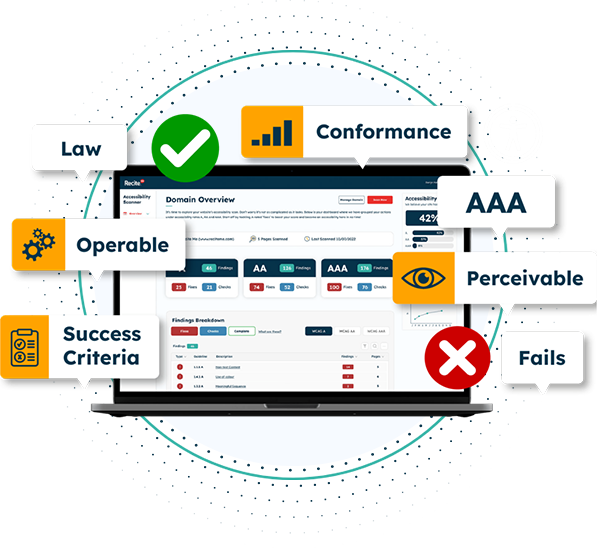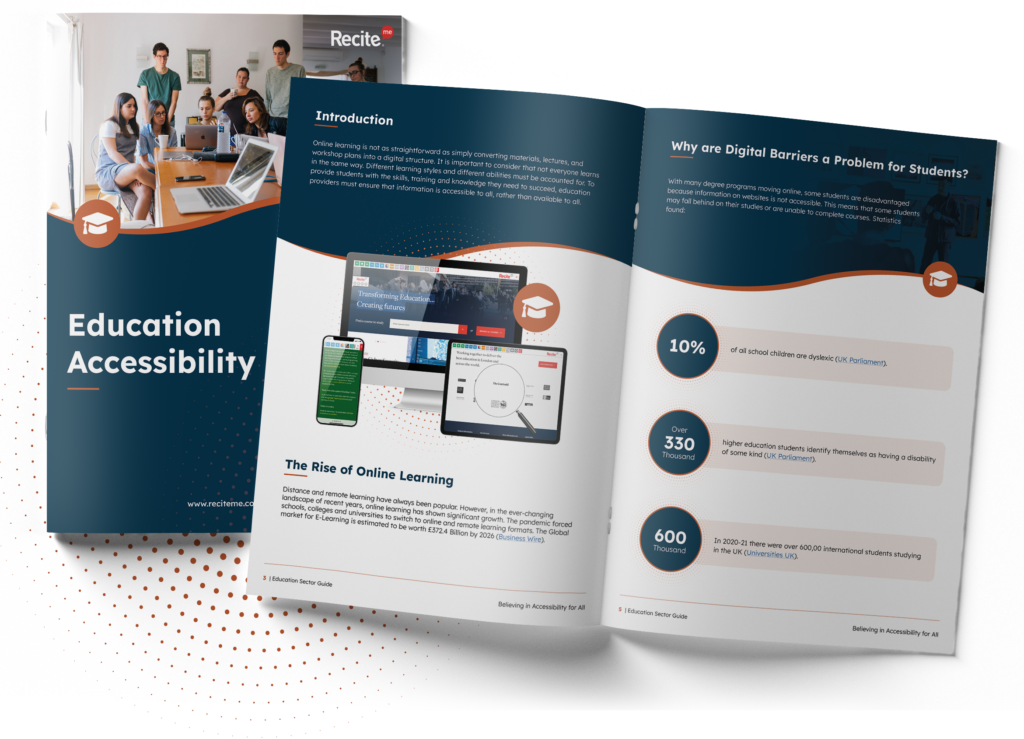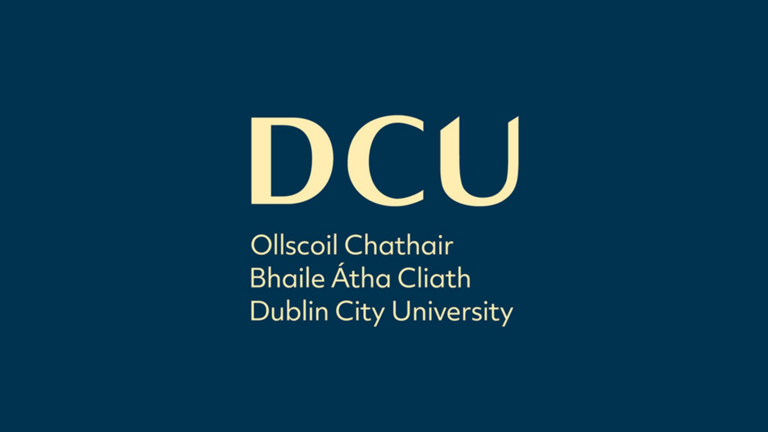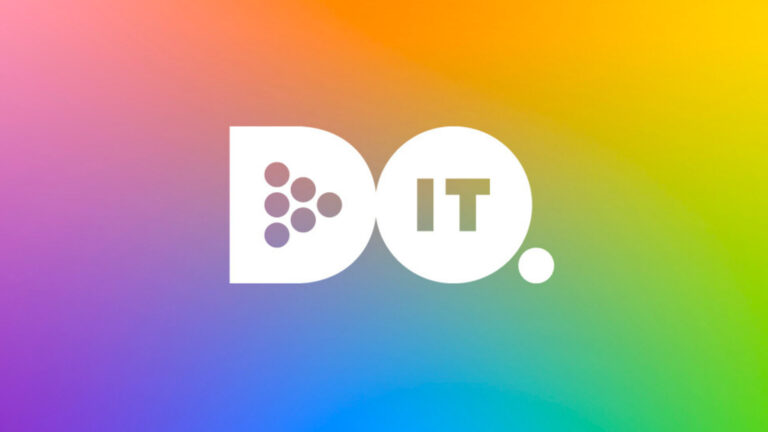Get Your Free Education Accessibility Guide
Download NowDiversity and inclusion in higher education extends beyond compliance alone. It helps cultivate a fairer working world and a healthier society, helping your university or college prosper at the same time. In an ideal world, students will have already experienced a high quality of D&I in primary and secondary education. So, higher education should act as a continuation of these good practices. In this article we will explore the different strategies, benefits and regulations surrounding Diversity and Inclusion in Higher Education.

What is Diversity in Higher Education?
Diversity in higher education is all about providing marginalised groups and disadvantaged students a pathway to university or college that they might not have been afforded otherwise, giving them a seat at the table as it were. It involves representing society fairly and intentionally giving a voice to those from different backgrounds and demographics.
Providing such opportunities is necessary to level the playing field and to ensure that every student has the same employment opportunities post-graduation. Perhaps even more crucial though is that diversity in higher education sets the foundations for a fairer society, one where a voice is given to people of different genders, races, sexual orientations, ages, abilities, religions, socioeconomic status, and other characteristics.
What is Inclusion in Higher Education?
Inclusion follows diversity closely. It is the idea of fostering an environment in which disadvantaged students, once getting a place in higher education, are able to flourish and have their voices heard. Inclusion in higher education ensures that students are not just given a seat at the table, but the correct support and resources to be able to have their voices heard.
Without a diverse student population, an inclusive environment cannot be created, and without an inclusive environment, diversity cannot achieve what it sets out to achieve. The two come as a double act, and an important one at that.
Whether inclusion comes by way of support groups, policy changes, or adjustments to an organisation’s culture, the aim is always the same – to encourage the active participation of a diverse student body across many different fields of study.
Download our Accessibility Education Guide
Download our inclusive education guide which looks at why digital barriers are a problem, who needs support, the importance of inclusive education, Recite Me clients, and an overview of our data from the past year.Strategies to Enhance Diversity and Inclusion in Higher Education
Ensuring diversity in any educational institute starts with recruitment. There are generally two approaches to student recruitment:
- Merit-based: e.g., entrance exams.
- Quota-based: e.g., reserving a percentage of available places for disadvantaged students and marginalised groups.
Incorporate a Quota-based Admissions System
At surface level, a merit-based system might seem the fairest approach. However, disadvantaged students often arrive at the front gates of their prospective university or college having had limited support or resources available to them in their prior schooling years, putting them one step behind their peers as early as the entrance examinations. This necessitates a balancing act between a sufficient quota-based admissions system and a merit-based system.
Changing a university or college’s recruitment process in this way requires a top-down approach, developing D&I focused recruitment policies at the upper-most level of governance. Until such a point where pre-university education becomes more equitable, a quota-based admissions system is imperative to maintaining a diverse student body.
Create an Accessible Website
Websites are the storefront of all modern day institutions, and universities and colleges are no exception. Websites are the place where prospective students can learn about your facilities, your culture, the support you offer, and, in some cases, where they take their first steps to a new life.
Therefore, diverse recruitment goes hand in hand with an accessible website. After all, if your website is not accessible for the very students you wish to recruit, then how can you expect to attract a diverse student body?
If you are unsure where to start, do some research on the Web Content Accessibility Guidelines (WCAG) – a set of standards published and updated by the Worldwide Web Consortium (W3C) regarding how to make websites, apps, PDFs, videos, and other emerging technologies more accessible for people with disabilities.
You can learn more about accessibility in higher education here.

Ensure Fair Access to All Disciplines
Granting disadvantaged students a place at your institution is a great first step, but the work is not done there. To ensure a truly diverse student body, it is important to maintain this mantra of equity throughout each area of study too.
This involves actively encouraging and supporting groups that are traditionally marginalised in certain disciplines, women in STEM being a prime example. Strategies can be as simple as setting up support groups at the student level, or as complex as modifying quota-based recruitment mechanisms at the executive level.
Either way, safeguarding fair access to all study disciplines for all students is crucial for diversity and inclusion in higher education institutes. This becomes especially true for those degree programmes which offer promising employment prospects and higher salaries after graduation.
Student Support
Offering student support is perhaps the most common and effective way of creating an inclusive environment for disadvantaged students to thrive in. At its very core, this means providing additional services, guidance, and resources that are tailored towards the specific needs of certain students. This could be additional ‘reduced size’ classes and free 1-to-1 sessions for students from a certain socioeconomic background. It could also be access to helpful technologies and tools, such as Recite Me’s Accessibility Toolbar, for the visually impaired or students for whom English is not their first language.
Fortunately, support for disadvantaged students can be packaged in a whole host of different ways. It just requires a bit of creativity and a real willingness to create an inclusive environment.
D&I Training and Knowledge Sharing
Many employees these days are crying out for an opportunity to learn more and develop their skill set. And considering that so much of creating an inclusive space is dependent on day to day interactions between staff and students, it makes absolute sense to incorporate some form of free diversity and inclusion training for all staff.
Then, with all your staff adept in the complexities of diversity and inclusion, why not launch a knowledge sharing campaign to be sure D&I remains a hot topic throughout your organisation. Make available on campus issues of relevant publications, such as the Journal of Diversity in Higher Education, which covers important content on all things D&I related within higher education.

What are the Benefits of D&I Strategies in Higher Education
The benefits of implementing the best diversity and inclusion strategies across your institution are far-reaching, extending beyond just the student population and into the wider society. A list of the most common benefits are outlined below:
- Enriched Educational Experience: We learn from others with different cultures, beliefs, and perspectives which are different to those of our own. People brought up differently to us bring fresh perspectives and ideas, promoting a healthy and flourishing learning environment for all.
- Enhanced Innovation: With increased diversity comes a broader talent pool, increasing chances of innovation. Given that most higher education institutes are centred around academic progression, this should be a top priority.
- Increased Growth: Opening your doors to a wider range of people expands your pool of prospective students. More students, in particular happier students, helps solidify your institution’s place as a reputable, high-performing contributor to the education system.
- Compliance: By ensuring diversity and inclusion, you cover your institution from any potential compliance issues relating to the various D&I regulations set out by your government.
- Progressive Society: Beyond just higher education, diversity provides the framework for a healthier society. Diversity challenges deep-rooted stereotyped preconceptions and demands that people challenge their unconscious bias whilst learning to communicate with people from a range of different backgrounds.
D&I Government Regulations Relevant to Higher Education
In the UK, several government regulations exist to help eliminate discrimination and advance equality across various bodies and institutions. This section outlines those that apply to higher education.

Public Sector Equality Duty (PSED)
Aimed at promoting equality and eliminating discrimination across the public sector, the PSED requires public bodies, such as colleges or universities, to consider how their policies and decisions affect those with protected characteristics, such as gender, disability, race, religion, age, and sexual orientation.
Compliance with PSED often involves conducting equality impact assessments, accruing equality data, and incorporating equality considerations into the top-level decision making processes.
Equality Act 2010
Similar to the PSED, the Equality Act 2010 aims to eliminate discrimination and promote equality throughout recruitment. It allows for positive action to be taken to address disadvantaged individuals, provided such actions are proportionate and justified. Most relevant, however, is that the act specifically prohibits discrimination, harassment, and victimisation based on any of the protected characteristics within education altogether, but specifically recruitment.
Our 40-page Digital Accessibility & Inclusion Toolkit helps businesses break down online barriers and make a real impact. It offers practical advice on all aspects of digital accessibility, from writing an accessibility statement to accessible website tips and inclusive hiring.
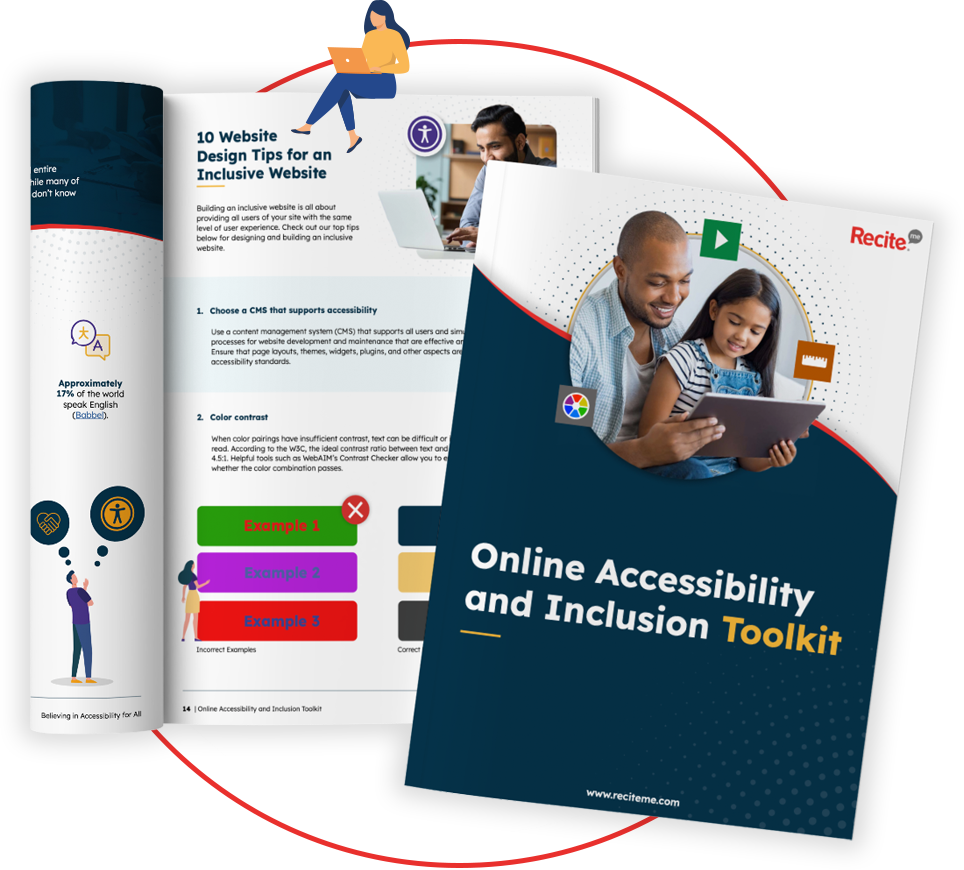
Tools to Help Recruit a Diverse Student Body
At Recite Me, we help organisations from all around the world become more inclusive with our range of accessibility tools, aiding educational institutions in a variety of different ways. While there is clearly numerous business cases for diversity and inclusion, finding the right tools to implement change can be difficult, but not with Recite Me.
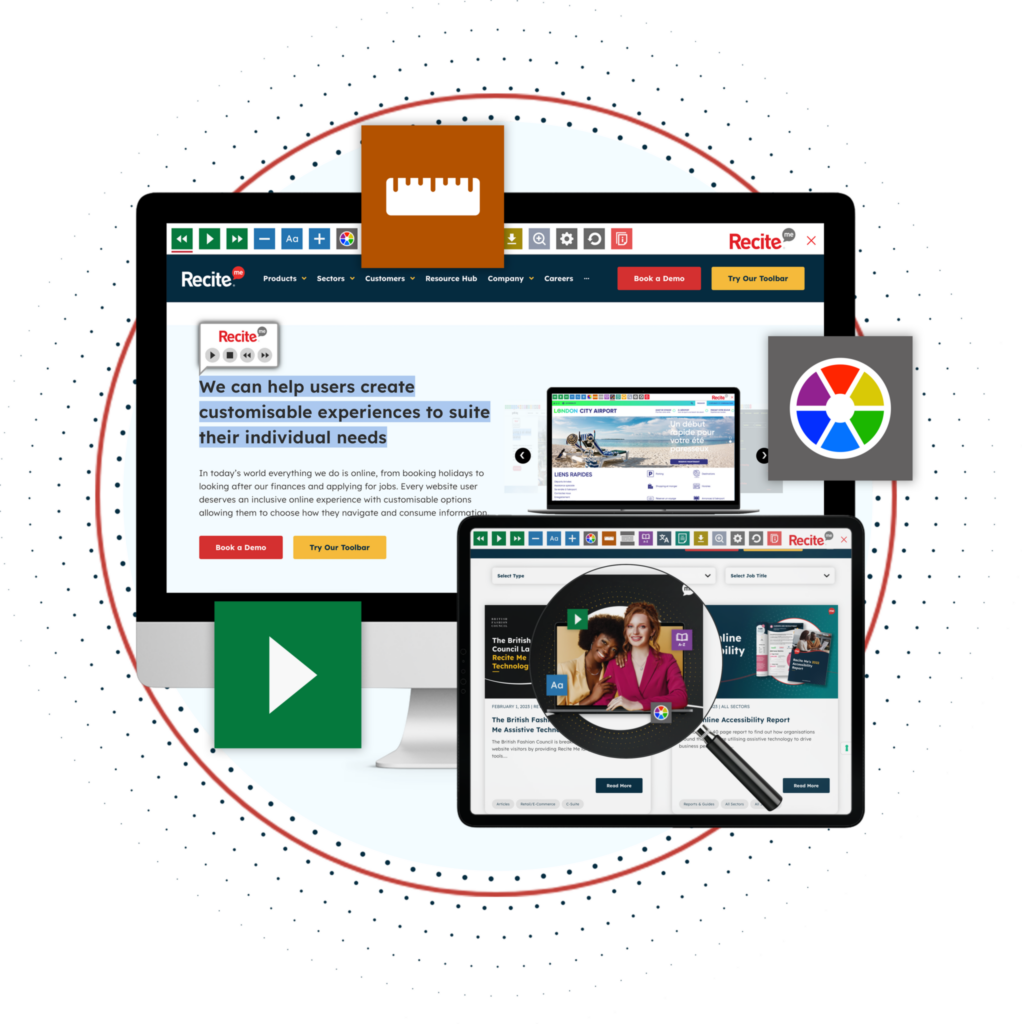
Accessibility Toolbar
Our Accessibility Toolbar is our longest standing product, it works by integrating with the universities, college or other institutions website. Once integrated, the toolbar can be used for a variety of different functions, mainly allowing the user to customise the website to suit their needs and preferences. Some of the Toolbars main features include:
- Personalise font size, colour and type.
- Screen Mask & Ruler tools for reading.
- Download written content as an audio file.
- Text-to-speech.
- Translation to over 100 languages.
- Customising PDF documents.
Accessibility Checker
Our Recite Me Accessibility Checker is a tool that higher education providers can use to highlight and fix inaccessible website design. The tool works by taking the URL of your website and performing a scan of the domain. The checker will then pull a report of accessibility issues into an actionable list, with suggestions and recommendations to help you resolve the issues. The step by step process of the checker is as follows:
- Step 1: Scan Your Domains
- Step 2: Identify Accessibility Issues
- Step 3: Fix Accessibility Errors
- Step 4: Track Your Progress
- Step 5: Download & Share and Accessibility Report
